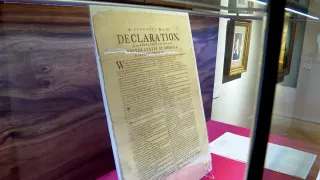December 10, 2020
'Mank' Takes a New Twist on the Life of the Noted Screenwriter
Brian Bromberger READ TIME: 2 MIN.
During this gloomy holiday season with an upsurge of Covid curtailing convivial celebrations, movie audiences might be seeking uplifting even inspirational entertainment, putting Mank, one of the most anticipated films of the year –now streaming on Netflix– at a distinct disadvantage.
Based on a screenplay written by his late father Jack, director David Fincher, in an overdue personal splashy return after 2014's Gone Girl, and celebrated for his psychological thrillers (Social Network, Zodiac), has taken a new career twist by focusing on the struggle of screenwriter Herman Mankiewicz to create his script for Citizen Kane in 1940.
This is no nostalgic love letter to the glamorous Golden Age of Hollywood, but a bumpy examination of the subtle cutthroat antics of an industry centered on money, power, and conformity at all costs.
Mankiewicz (1897-1953) was the journalist, critic, and playwright, who journeyed west in the late twenties, to write screenplays, but whose talents were also used to repair troubled scripts (i.e. The Wizard of Oz) usually uncredited. Known for his cynical wit, Mank (Gary Oldman) was the life of the party. Known for volleying sarcastic comeback lines, he became a prized guest at the Hollywood star-studded weekends at newspaper mogul William Randolph Hearst's San Simeon mansion/retreat. However, Mank was an alcoholic and gambling addict who could be alternatingly charming and obnoxious.
He starts a touching friendship with Hearst's mistress, actress Marion Davies (Amanda Seyfried), linked by their mutual feelings of being misunderstood, not taken seriously, and under-appreciated. Davies, a gifted comedienne known for her geniality and down-to-earth charm, was being forced into unsuitable dramatic roles by Hearst. The film meanders back and forth in flashbacks between when Mank first met Hearst (a courtly Charles Dance) and Marion, chronicling his deteriorating relationship with the former throughout the thirties.






